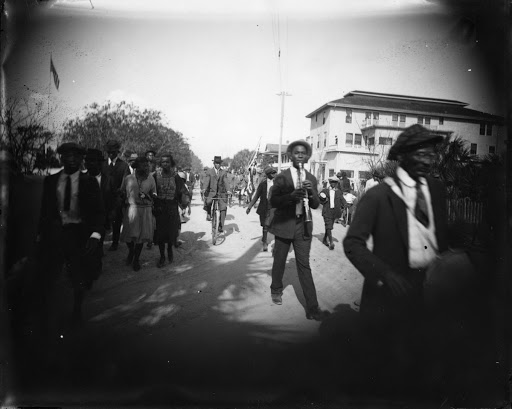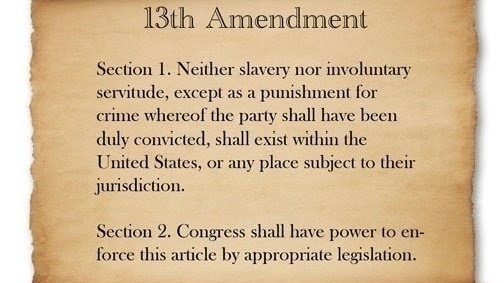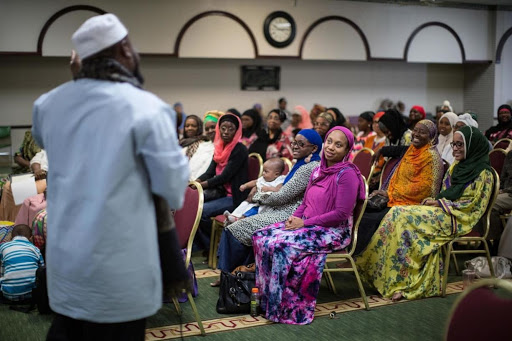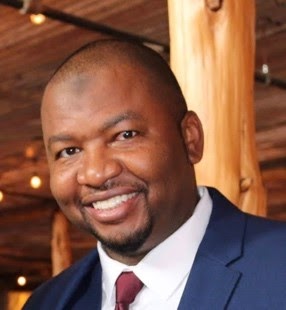Juneteenth, the Evolution of American Slavery And Important Lessons For Black Muslims
Imam of Masjid Al-Islam writes about the significance of the holiday which originated in Texas and has just been declared the first federal holiday since Martin Luther King, Jr. Day.

On June 19, 1865, Major Gen. Gordon Granger rode into Galveston, Texas and issued orders for all slaves to be freed. Juneteenth (a combination of June and Nineteenth) is recognized as the official end of chattel slavery in the United States.
But it took two and a half years for the Emancipation Proclamation to be realized in Texas — the last stronghold for slaveholders and Confederate soldiers. Many of them retreated further and further west as the Civil War drew to a close. The newly freed African Americans began celebrating Juneteenth the following year and have continued that celebration as a day filled with food, family, music and fun activities.
 Pictured: An Emancipation Day parade in 1922 in St. Augustine, Fl.
Pictured: An Emancipation Day parade in 1922 in St. Augustine, Fl.
This moment in U.S. history was significant in the journey towards a more just society. Chattel slavery was a brutal and dehumanizing practice, characterized by ownership of a human being and their offspring forever. White Americans were exempted from chattel slaver which only applied to enslaved people brought from Africa. Thus, the U.S. drew deep fault lines around race that still exist today.
Slavery had flourished in America for nearly 250 years and required a very violent and contentious Civil War to bring it to an end. Ten out of the first 12 U.S. presidents were slave owners — it was a fundamental part of America’s economic success and social structure. The 13th Amendment, ratified in 1865, actually freed all slaves in the country stating:
“Neither slavery nor involuntary servitude, except as a punishment for crime whereof the party shall have been duly convicted, shall exist within the United States, or any place subject to their jurisdiction.”

A basic reading of this Amendment reveals that slavery was not actually fully abolished, but merely restricted to criminals. Consequently, newly-freed African Americans were targeted for petty crimes, such as loitering, and placed back in chains to work for the State. In a sense, slavery simply evolved. For some, modern-day American slaves are referred to as inmates often wearing uniforms that declare them “State Property.”
Prison labor still remains a source of cheap labor and it is not always voluntary. America is the world capital of mass incarceration and from the outset, there have always been a disproportionate number of African Americans incarcerated, paroled and arrested. With the emergence of Private Prisons in the 90s, there is a strong financial incentive to continue supplying these prisons with inmates.
The Quran instructs us to “be a community that calls for what is good, urges what is right, and forbids what is wrong.” In order to do this, we must be aware of the historical and social context of the U.S. before we can effectively cultivate any Islamic solutions to its challenges. We must understand the attitudes, beliefs and actions that led American society to its present condition.
 Image courtesy of Mosa'ab Elshamy, Associated Press
Image courtesy of Mosa'ab Elshamy, Associated Press
As Muslims, we must also be aware of the various disparities that exist along racial lines. This knowledge is a prerequisite to any level of activism. It is simply not feasible to establish an authentic Islamic influence in a society without a solid understanding of that society — that only leads to further injustice and can do more harm than good.
The African American Muslim community is nicely positioned to help American Muslims lead the charge against present-day racism. The African American experience is essential to any effort to establish Islam in America. It shines a light on the truth of American history, character and possibilities.
Despite the fanfare and praise, President Biden’s declaration of Juneteenth as a federal holiday is a symbolic victory at best. African Americans have not been fighting for a holiday. Our leaders and organizers have been pushing for reparations, police reform, criminal justice reform, small business investments, education reform and the like. It is time for American Muslim organizations and leaders to tackle these same issues on their platforms as well.
It’s simply the right thing and the Islamic thing to do.

Muhammad Abdul-Jami is the Imam of Masjid Al-Islam in Dallas, Texas. In 1999, he became the first recipient of a Bachelor of Arts degree in Islamic Studies from the University of Texas at Austin.
